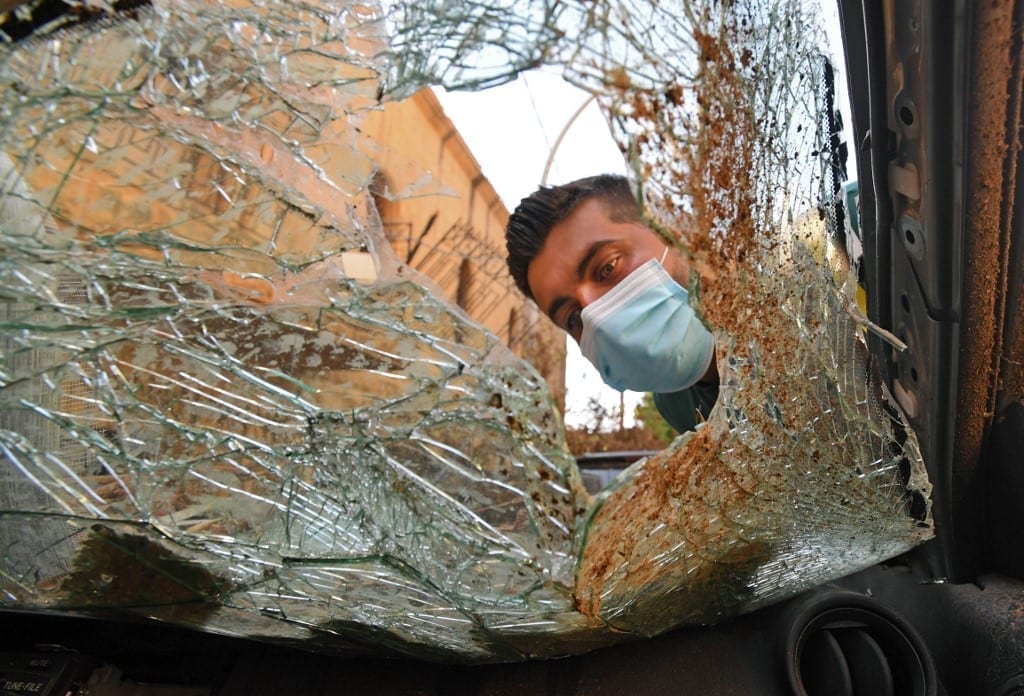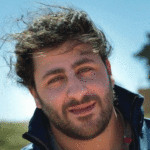It does not snow in Beirut and nothing falls silently on the people of this city. Beirut, the city which had been full of life, was ravaged by the sound of an explosion that collapsed on the heads of its residents, killing them in silence. The silence of this city is more dreadful than the magnitude of the destruction. Since the first day of the explosion, I could not cry. I preferred to keep silent, in solidarity with the streets of a city that witnessed our loud noises and laughter. The silence of the city has conjured up pictures and faces of people I have met. There are memories that I thought were erased from my mind as time went by, but while I was roaming the streets, my previous life began to unfold in front of me. I remembered a kiss I stole in front of a restaurant in Gemmayze. I recalled a friend’s room in which we spent many years, our favorite game at the time being peeking on the buildings’ roofs and shouting at those who were standing there, then hiding quickly. I remembered the 500- Lira phone at the Armenian Siham’s shop; which was the link between our friends. I remembered Siham’s voice saying: “the 500 Lira is over.”
I recall the post-July 2006 war period, despite the destruction the country had witnessed from north to south, we did not lose hope, our lives had soon returned to normal. But today, I feel nothing, I do not feel like crying, nor laughing, we are the corpses of August 4th, nothing more.
There is nothing here but silence. The only noise was made by our feet while we stepped on the piles of debris and shattered glass. Words do not come of our mouths, even to commiserate each other. There is nothing to be said. I feel like a dead body passing on the streets. I remember a novel named Frankenstein in Baghdad, in which the following phrase was written: “No one wants to die without knowing why he dies and where he will go after death.” I get confused when asking if there are any victims in the houses we visit. I get more confused when I say that they are victims. Do I call them martyrs, casualties, or victims? It was Tuesday, and it was as boring as any Tuesday. No one wanted to die on that day. I do not know where begin. There were silent people with gloomy faces, sitting in front of their demolished houses, trying to remember those life-changing seconds, but they chose to keep silent. As if It was the first time for us to witness a death that was so close and certain. I remember in the previous explosions that struck Lebanon since 2005, how many people were there in the scene and at the moment of the explosion, and they miraculously survived. This time, everyone was silent. No one wants to die, like the voice of that boy in the video who was watching the fire with his family and was repeating with childlike mockery “An explosion, an explosion,” till the moment when the explosion hit his house, and his voice was clearly heard that time, saying to his father: “I do not want to die, I do not want to die.”

From the very moment of the explosion, I did not care to see what happened, or the scale and the gravity of the explosion. With every video I received, I put the phone closer to my ear to hear the sounds and voices. I remember the voice of a woman, who was screaming for her husband to move away from the window, and suddenly they were wasted by the blast, and only groaning sounds could be heard afterward. I imagine these seconds: when death is so close and inescapable, will you be able to bring back your life memories right before your eyes as seen in the movies?
I have never been weak in the face of death. The sanctity of death had never forced me to keep silent. I always find something to say or a way to express it, often by laughter. But this time was different. I feel as if we are dead people providing solace to dead people. We are no longer even “The miserable who laugh away their hardships.” Indeed, the miserable of this city can no longer brush aside their problems. An old man, sitting in front of his house in Karantina, told me: “Look carefully at the history of this city, perhaps it was built on inalienable endowment properties, maybe that is why we are witnessing hardships after hardships.” Near him sits a young man who had lost his leg and a part of his hand and was smoking heavily. He picked up a pack of cigarettes to show me what is written on it: “Smoking kills,” he said with a laugh, “Beirut kills, not smoking.” A little girl approached him, laying her face on his shoulder. He looked at me again, read the name of an international organization on my sweater, and said: “I do not want your help, take the girl and her brother out of the country, let them live, I do not want them to die here.” A moment of silence prevailed. I looked at the little girl as she sticks more to her father and buries her head in his shoulder, so he starts kissing her head hysterically and then bursts into tears. I apologized and left.
Death was so close to everyone, but at least we have the luxury of grieving, while thousands of others do not. They do not have the time to grieve, they try to rebuild their lives by collecting lost memories along with a framed photo of the people they love.
Death was so close to everyone, but at least we have the luxury of grieving, while thousands of others do not. They do not have the time to grieve, they try to rebuild their lives by collecting lost memories along with a framed photo of the people they love. They have lost their loved ones, their homes, and even their daily routine they were accustomed to. I went with a Syrian young man to his house to assess the extent of the damages. He showed me his five children, the eldest of them was seven years old. They still had small strands of glass in their bodies. We brought a medical team to try to get the glass shards out and we sat down to watch them. All his children were born in Lebanon, and he was keen on living in a house with a small yard so they could play. They were playing in the yard like any other day, the broken glass penetrated their bodies. Afterward, one of his children approached, laughing, to show his father a frilly colored bandage on his finger. The father asked us to cover the door and windows with nylon. “Their mother and I take turns to stay up at night when they sleep for fear of a rat or anything else that might hurt them”, he said. I kept silent once again, not knowing what to say. The obvious questions that we usually raise at times of explosions or catastrophes have become meaningless and we no longer wait for their answers. We silently look at the people affected by the catastrophe as if there is absolutely nothing to say. Then, I passed by one of the bars where I used to pass my time and I found it destroyed, its owner standing in front of it having visible fractures, scars, and wounds, and I stupidly asked him: “How are you?” He did not answer, looked at me, and smiled in agony, and I realized the stupidity of my question, I apologized and left.
I recall the post-July 2006 war period, despite the destruction the country had witnessed from north to south, we did not lose hope, our lives had soon returned to normal. But today, I feel nothing, I do not feel like crying, nor laughing, we are the corpses of August 4th, nothing more.






